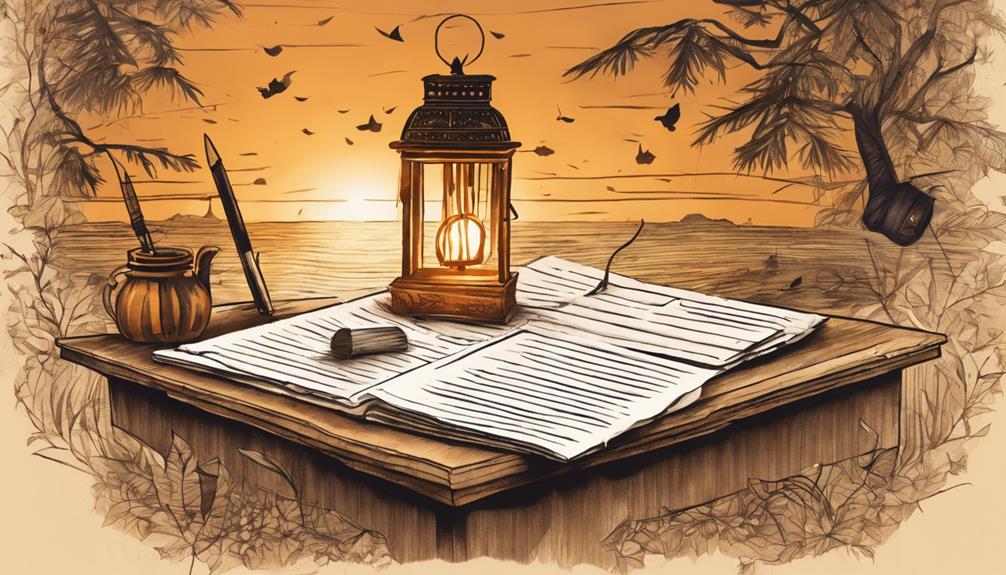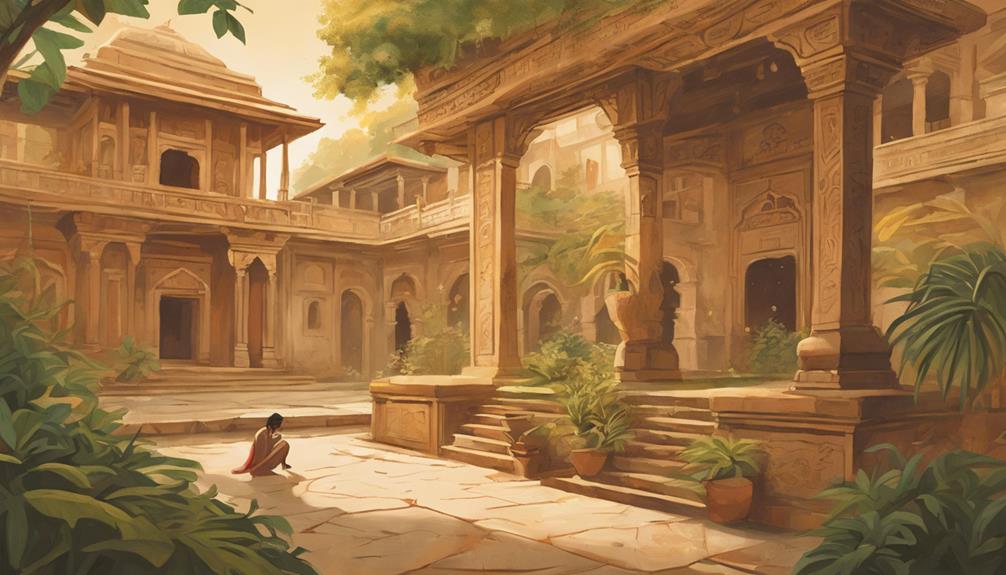As you explore the evolution of Bengali poetry, you'll find that Rabindranath Tagore's revolutionary themes and poetic style ignited a cultural Renaissance. Tagore's exposure to Western literature influenced his use of imagery, metaphor, and symbolism, fusing Eastern and Western sensibilities. His poetry challenged societal norms, addressing issues like casteism, nationalism, and women's rights, reflecting cultural upheaval and transformation. With Tagore as the epicenter, Bengali poetry underwent a transformation, paving the way for modern writers. As you continue to uncover the layers of Bengali poetry, the rich cultural heritage and Tagore's enduring legacy await your discovery.
The Roots of Bengali Poetry

As you explore the rich tapestry of Bengali poetry, you'll find that its roots can be traced back to the ancient Vedic period, with the Vedas and the Puranas laying the foundation for a poetic tradition that would eventually give rise to some of the most iconic voices in Indian literature. The Ancient Vedas, revered as sacred texts, contained hymns and prayers that showcased the earliest forms of poetic expression in the region. These ancient texts not only influenced the development of Bengali poetry but also shaped the literary landscape of the Indian subcontinent.
Folk traditions also played a significant role in shaping Bengali poetry. Oral traditions, passed down through generations, preserved stories, myths, and legends that would later influence the works of Bengali poets. The folk songs and ballads of rural Bengal, known as 'Baul' and 'Vaishnav' respectively, added to the rich cultural heritage of the region, providing a fertile ground for poets to draw inspiration from. As you explore further into the world of Bengali poetry, you'll discover how these ancient and folk traditions converged to create a unique and vibrant literary landscape.
Tagore's Early Life and Influences

Born in 1861, in the midst of India's tumultuous struggle for independence, Rabindranath Tagore grew up in a family that valued education and the arts, with his father, Debendranath Tagore, playing a significant role in shaping his early literary pursuits. As you explore Tagore's early life, you'll find that his childhood inspirations were deeply rooted in the cultural and intellectual atmosphere of his family. His father, a prominent social reformer and poet, instilled in him a love for literature and the arts. Tagore's family dynamics were marked by a strong emphasis on education, which led him to develop a deep appreciation for Bengali literature and music. You'll notice that his father's influence extended beyond literature, as Debendranath's own poetry and philosophical musings had a profound impact on Tagore's worldview. This unique blend of family dynamics and cultural heritage laid the foundation for Tagore's future literary endeavors, which would go on to shape the course of Bengali poetry.
Revolutionary Themes in Poetry

You'll find that Tagore's early influences laid the groundwork for his later exploration of revolutionary themes in poetry, which boldly challenged the status quo and sparked a cultural awakening in Bengali literature. His poetry became a catalyst for social change, as he addressed issues like casteism, nationalism, and women's rights. Through his work, Tagore voiced the aspirations and frustrations of a generation, giving expression to the simmering discontent of a people longing for freedom and self-expression.
As you explore his poetry, you'll notice how Tagore's words capture the essence of cultural upheaval, reflecting the turmoil and transformation of a society in flux. His poetry is a tribute to the power of art to inspire and provoke, to challenge and subvert. By examining themes of identity, morality, and social justice, Tagore's poetry ignited a fire that would burn brightly, illuminating the path to a more just and equitable society. Through his revolutionary themes, Tagore not only reflected the changing times but also helped shape the course of Bengali literature, leaving an indelible mark on the cultural landscape.
The Impact of Western Literature

Tagore's exposure to Western literature, particularly the works of Shakespeare and Shelley, had a profound impact on his poetic style, influencing his use of imagery, metaphor, and symbolism to convey complex emotions and ideas. You see, his fascination with European Romanticism led him to explore the domain of the human experience, delving into the depths of love, nature, and the human condition. The Victorian Era's emphasis on emotion, imagination, and individualism also resonated with Tagore, as he began to weave these influences into his own unique narrative. As you explore his poetry, you'll notice the subtle yet profound impact of Western literature on his work. The echoes of Shakespearean sonnets, the Shelleyan lyrical quality, and the Romantic emphasis on nature all blend together to create a unique Bengali poetic voice. This fusion of Eastern and Western sensibilities gave birth to a new era in Bengali poetry, one that would forever change the literary landscape of India.
Tagore's Poetic Style and Form

As you explore Tagore's poetic oeuvre, it becomes evident that his style is characterized by a distinctive fusion of musicality and lyricism, which imbues his verses with a sense of introspective contemplation. This unique blend allows him to craft verses that are both deeply personal and universally relatable. One of the hallmarks of Tagore's poetry is his masterful use of symbolic imagery, which enables him to convey complex emotions and ideas with precision and subtlety. For instance, his frequent deployment of natural imagery – such as the moon, the river, and the forest – serves as a powerful metaphor for the human experience. Moreover, Tagore's poetry is notable for its cultural synthesis, which seamlessly integrates elements of Bengali folklore, Hindu mythology, and Western literary traditions. This synthesis imbues his poetry with a rich cultural complexity, making it both rooted in its native context and universally accessible. Through his innovative use of form and style, Tagore has created a poetic language that is both intimate and expansive, inviting readers to engage with his work on multiple levels.
Nationalism and Independence Movement

During the tumultuous era of India's struggle for independence, Rabindranath Tagore's poetry became a powerful catalyst for nationalist sentiment, inspiring a generation of Indians to demand freedom from colonial rule. You can sense the fervor in his words, which resonated deeply with freedom fighters, who saw in them a reflection of their own aspirations for self-governance. Tagore's poetry became an anthem for the masses, galvanizing them to resist colonial oppression and fight for their rights. His verses, imbued with a sense of national pride and identity, helped to forge a collective consciousness among Indians, fostering a shared sense of purpose and unity. As you explore his works, you'll discover how Tagore's poetry not only reflected the turbulent times but also helped shape the country's response to colonial rule. His words continue to evoke a sense of national pride, serving as a demonstration to the power of poetry to inspire and mobilize.
Tagore's Global Recognition and Legacy

Beyond the Indian subcontinent, Rabindranath Tagore's poetry resonated with readers worldwide, earning him the distinction of being the first non-European to win the Nobel Prize in Literature in 1913. This recognition not only solidified his status as a literary giant but also underscored the significance of Indian literature on the global stage. You see, Tagore's Nobel Prize wasn't just a personal achievement; it was a confirmation of the power of Bengali poetry to transcend cultural boundaries. As a cultural ambassador, Tagore's work facilitated a cross-cultural dialogue, introducing Western readers to the rich cultural heritage of India. His poetry, with its universal themes and evocative language, dissolved borders, fostering a sense of global citizenship. The Nobel Prize's significance, hence, lies not only in its validation of Tagore's artistry but also in its role in promoting cross-cultural understanding and exchange. Through his work, Tagore embodied the ideal of cultural ambassadorship, inspiring future generations to engage in a global conversation.
Bengal's Literary Heritage Today

Rabindranath Tagore's legacy continues to inspire generations of Bengali writers, and you're likely to find that the region's literary heritage today is a vibrant tapestry woven from the threads of tradition and innovation. As you explore the contemporary literary scene, you'll notice that modern readerships are increasingly fragmented, with diverse interests and preferences. However, this hasn't deterred Bengali writers from experimenting with new forms and styles, often blending traditional themes with modern sensibilities. Digital archives have made it possible for readers to access and engage with Bengali literature like never before, opening up new avenues for exploration and discovery. The internet has democratized access to literary works, enabling readers to engage with Bengali poetry and fiction in ways that were previously unimaginable. As a result, Bengal's literary heritage today is characterized by a dynamic interplay between tradition and innovation, with writers continually pushing the boundaries of language, form, and content.
Frequently Asked Questions
Did Tagore's Poetry Only Focus on Indian Independence?
You might think Tagore's poetry solely focused on Indian independence, but that's not entirely true. While his work did reflect nationalist sentiments, it also explored cultural identity and the human experience. Tagore's poetry delved into the intricacies of Indian society, embracing universal themes like love, nature, and spirituality. His writing was not limited to the struggle for independence, but rather a nuanced exploration of the Indian psyche.
Was Tagore the First Bengali Poet to Gain International Recognition?
You're likely wondering if Rabindranath Tagore was the first Bengali poet to gain international recognition. Indeed, he was a literary pioneer who transcended geographical boundaries, celebrating cultural identity through his works. Tagore's poetry, infused with Bengali sensibilities, resonated globally, earning him the Nobel Prize in Literature in 1913. His success paved the way for other Bengali poets, solidifying his position as a groundbreaking figure in world literature.
How Did Tagore's Poetry Influence Bengali Music and Art?
You think you can just waltz into the world of Bengali art and music without knowing how Tagore's poetry revolutionized it? Think again! His lyrical masterpieces harmonized with musical harmonies, crafting a symphony of artistic expressions. Tagore's poetic nuances infused Bengali music with emotional depth, while his words inspired artistic expressions that continue to evoke feelings of nostalgia and longing. His influence birthed a cultural renaissance, shaping the very fabric of Bengali art and music.
Did Tagore's Poetry Only Cater to the Bengali-Speaking Population?
As you explore Tagore's poetry, you might wonder if his work only resonated with Bengali speakers. Not quite. Tagore's poetry transcended linguistic boundaries, tapping into a shared cultural identity that stirred national pride across India. His verses wove a tapestry of universal emotions, making his poetry relatable beyond regional confines. By investigating the human experience, Tagore's work became a reflection of the collective soul, bypassing linguistic and cultural divides.
Are Tagore's Poems Still Widely Read and Studied in Schools Today?
You may wonder if Tagore's poems still resonate with modern readers, particularly in educational settings. Indeed, his literary merit endures, as his works continue to be widely studied in schools today. The cultural relevance of his poetry, which explores universal themes like love, nature, and the human condition, remains undiminished. His poems' timeless appeal lies in their ability to transcend linguistic and cultural boundaries, making them a staple in many curricula.


